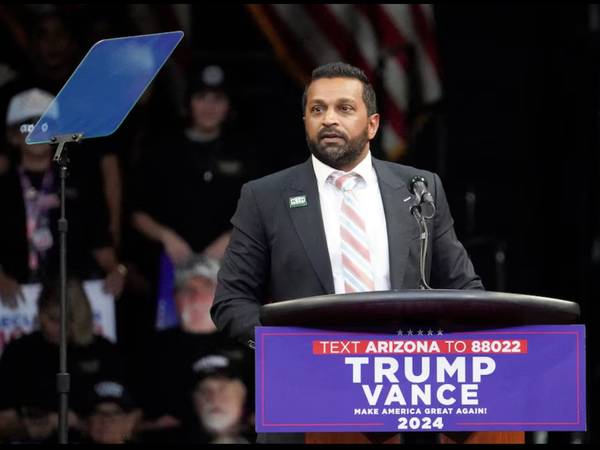US President-elect Donald Trump's nomination of Kash Patel as FBI Director could potentially sharpen US efforts to prevent Iranian influence operations in the United States that have raised alarm since 2023.
Patel, a former prosecutor and senior intelligence official during Trump’s presidency, has been an ardent critic of the Biden administration’s policies toward Tehran, accusing them of empowering the Islamic Republic through financial and strategic concessions.
In an interview with Fox Business in March, Patel said, “President Biden gave Iran $7 billion and opened up the global financial oil trade sector to them to make another $80 billion.”
He was referring to Iranian funds blocked by South Korean banks that the US asked to be released and deposited in special accounts in Qatar after Iran released five Americans held in Iran for several years.
“This allowed all their foreign partners, like the CCP and Russia, to get in on the action," he said referring to the Chinese Communist Party.
"It’s an intentional dereliction of duty to allow Iran back into the global scene and allow Iran to re-enter their nuclear deal. Remember, this program, architected by Obama and Biden and pushed out by Harris, …is meant to give them a nuclear weapon on a timeline,” he added.
Patel, if confirmed, would replace Christopher Wray seven years before the end of his term, underscoring Trump’s willingness to reshape the FBI’s leadership to align with his administration’s priorities.
The FBI director typically serves a single 10-year term to insulate the agency from political influence. However, Trump’s firing of James Comey in 2017 signaled his readiness to exercise authority over the bureau's leadership.
Critics of Patel’s appointment have voiced concerns over the potential politicization of the FBI, noting his close ties to Trump and his outspoken stances on divisive policy matters.
A hawkish perspective on Iran
Patel’s track record suggests his leadership would bring a hawkish approach to countering Iranian influence.
Speaking in March, Patel criticized the Biden administration’s renewal of sanctions waivers on Iran, describing it as a form of appeasement. “You are either for the mullahs and ayatollahs in Iran or you are against them,” he said in another Fox Business appearance.
“The Trump administration was wholly against them, withdrew from the JCPOA, used suffocating sanction to ensure they did not monetize their oil regime to enrich their weapons-grade nuclear program. That’s the ultimate deterrent.”
He further questioned Biden’s assertion that the funds released were intended for humanitarian aid, suggesting they indirectly financed groups like Hamas, which Patel called an Iran-funded organization.
Patel has also drawn attention for his allegations about pro-Islamic Republic operatives embedded within the Biden administration. He pointed to individuals like Robert Malley, Ariane Tabatabai, and Maher Bitar as examples of this influence, citing communications between Tabatabai and Iranian officials.
“Robert Malley, Biden's number one envoy, the guy that's supposed to be keeping us out of war in Iran, had his clearance, security clearance suspended by Chris Ray's FBI... You got to ask why they won't publicly release it.”
“Well, let me tell you why. Because an individual named Arianne Tabatabai, who, by the way, is currently running our special operations office at the Department of Defense was installed there by Robert Malley. Yes, the former presidential envoy to Iran installed this Iranian national to that position in DoD. And do you know what she did in 2014? She emailed the the foreign minister of Iran, Javed Zarif, and asked for permission as a US citizen to take a trip on behalf of the US government,” he added.
If confirmed, Patel could lead the FBI in intensifying its focus on Iranian activities within the US, including efforts to counter espionage, influence operations, and cyber threats.
For Iran, Patel’s nomination would likely signal a heightened US effort to counter its global influence, reinforcing Trump’s legacy of prioritizing Tehran as a primary adversary in American foreign policy.
